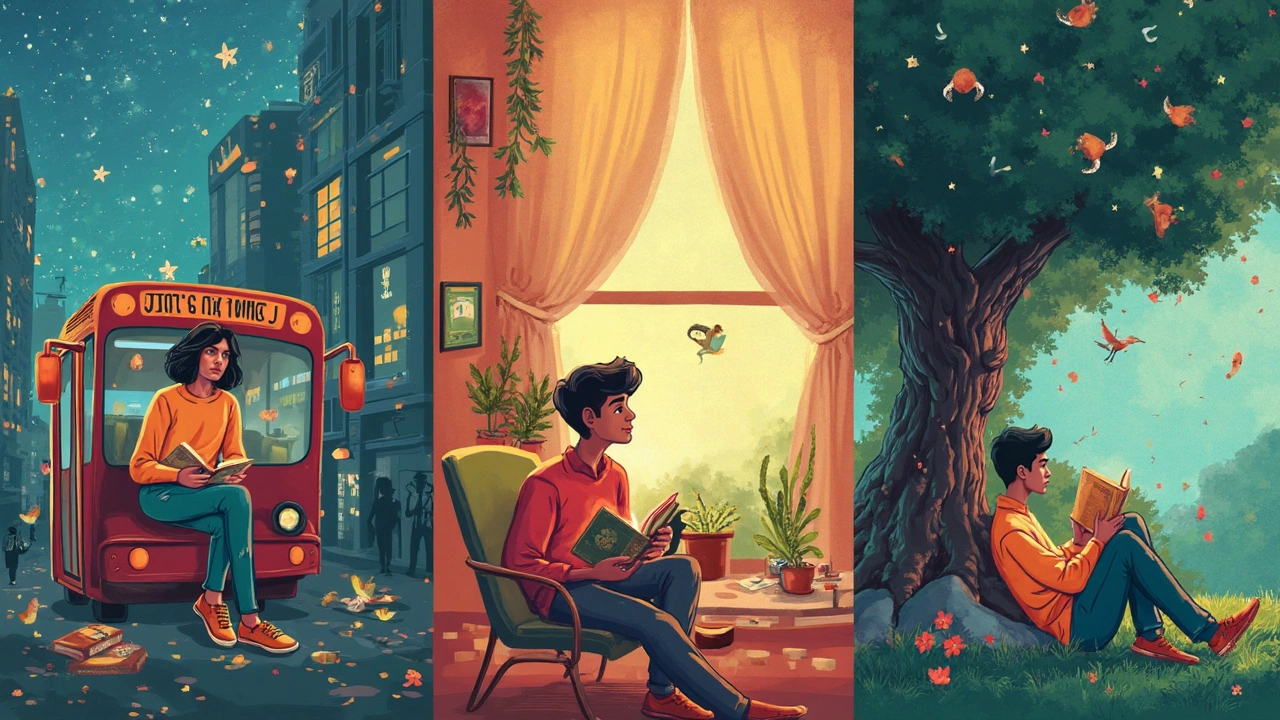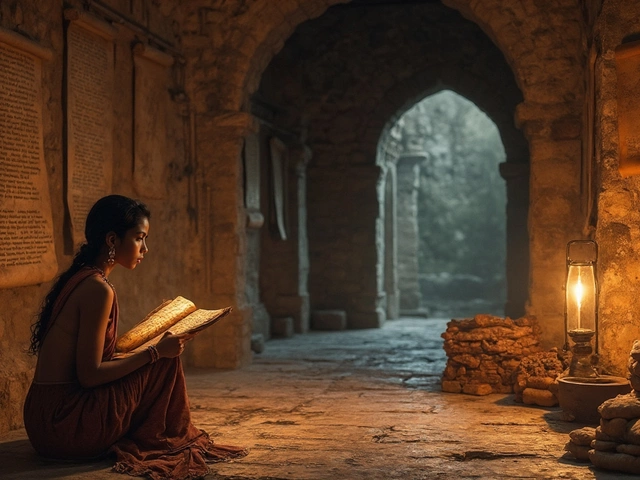
If you’re 20 and eyeing that YA novel on the shelf, just grab it. There’s no book bouncer checking your ID at the library. Despite the label “young adult,” loads of readers in their 20s—or 30s and way beyond—snap up these books all the time. In fact, a 2012 Bowker Market Research report found that over half the people buying YA weren’t actually in the official teen age range.
Why? YA stories usually dig into topics like identity, making choices, awkward relationships, and feeling lost (let’s be real, that doesn’t just stop at high school graduation). Plots move quickly, dialogue feels real, and characters mess up in ways we all recognize—no matter your age. Most importantly, you’re not too old to care about big feelings, hope, or a twisty romance.
Next time someone raises an eyebrow at your bookshelf, just remember: books don’t have age limits. YA isn’t a club for teens—it’s a way of telling stories about figuring things out. And who honestly has adulthood sorted at 20? Not many, for sure.
- Why YA Appeals Beyond Teens
- What Really Defines YA
- Does Your Age Matter?
- Best YA Picks for 20-Somethings
- Getting the Most from YA as an Adult
Why YA Appeals Beyond Teens
Ever notice how bookstores create special displays for YA books, and it's not just teenagers checking them out? It's because young adult fiction has some bold selling points that go way beyond a high school crowd. Actually, a 2012 Publishers Weekly survey found that 55% of YA books were bought by adults over 18—so if you’re 20, you’re in big company.
For one, YA books focus on stories that hit close to home for all ages. Characters might technically be in high school or starting college, but they’re often dealing with stuff that doesn’t magically stop once you hit your twenties (or thirties). We’re talking first jobs, family drama, learning to trust yourself, finding friends who actually get you—the kind of challenges that stick around way after graduation.
YA fiction is also known for being fast-paced and easy to get into. Forget long chapters filled with drawn-out descriptions; most YA authors cut right to the point. There’s an emotional honesty in these books you won’t always find in "grown-up novels." You get high stakes, but without needing a dictionary just to follow the plot.
Not sure what older readers are looking for in YA compared to teens? Check out this quick breakdown:
| Feature | Why Teens Like It | Why Adults Like It |
|---|---|---|
| Relatable Characters | See themselves in the main characters | Reminds them of their own experiences or helps process unfinished stuff |
| Fast Pacing | Stays exciting—no boring bits | Perfect for busy schedules and short attention spans |
| Hopeful Vibes | Makes them feel excited about the future | Offers nostalgia and optimism, which is rare in other genres |
| Universal Themes | Helps them figure out life and identity | Offers second chances to reflect on big life decisions |
Genres in YA aren’t limited, either. Fantasy, sci-fi, romance, mystery—there’s something for everyone. And unlike some adult novels, YA doesn’t judge. You won’t find snobby attitudes about what you “should” read. It’s all about connecting and feeling understood, no matter your age.
What Really Defines YA
People throw around the term YA (young adult) all the time, but what actually puts a book in that category? It isn’t just about how old the characters are. Sure, most YA stories focus on teens, usually somewhere between 13 and 18, but there’s more to it than just age.
The real core of YA fiction is the experience. YA books are about figuring stuff out for the first time—friendships that fall apart, first loves, screw-ups, big family drama—you name it. But the heart of YA isn’t tied up in a coming-of-age story, either. Plenty of YA dives into tough issues: grief, mental health, racism, and finding your place in the world. The difference is in how it’s told—quick pacing, personal struggles front and center, and a direct, no-nonsense voice.
Some think YA fiction is just about high school cliques or love triangles, but that’s only a fraction of the scene. You’ll find every genre in YA: gritty thrillers, sci-fi adventures, heartfelt contemporary stories, and even horror. Look at books like "The Hate U Give" by Angie Thomas or "They Both Die at the End" by Adam Silvera. These stories tackle real-world problems and ethical questions, and they resonate with older readers just as much as they do with teens.
On the business side, publishers slap the YA label on books they believe will click with teens. The decision is mostly about marketing to that age group, not an actual reading restriction. Adults can—and do—pick up YA titles just for the rush of a fast-paced story that doesn’t waste time. No surprise then that YA books have loyal fans across every age group.
So, YA is basically a mix: mostly young characters, real emotions, and honest problems, plus some fearless storytelling. If you’re after stories that don’t drag, take risks, and actually feel like life in your twenties (even with a few dragons or dystopias thrown in), YA is your spot.

Does Your Age Matter?
If you’re worrying about being too old for YA, you’re not alone. Plenty of people think there’s a cutoff, but that idea doesn’t hold up. The YA books label is really about marketing, not rules. Publishers use it to target a certain age group, mostly 12 to 18-year-olds, but they definitely don’t check birth certificates at checkout.
Here’s a reality check: a Publishers Weekly report in 2012 broke down who’s actually reading YA. Over 55% of YA readers are over 18! That’s more than half—and it doesn’t even count all the young-at-heart who borrow from the library or read on friends’ Kindles. Check out this quick breakdown:
| Age Group | Percent of YA Buyers |
|---|---|
| Under 18 | 28% |
| 18-28 | 28% |
| 30+ | 44% |
No one is keeping tabs on your age from the book aisle. YA themes—figuring out who you are, making tough choices, dealing with messy relationships—don’t stop being relatable just because you’re legally an adult. In fact, your twenties can be even more confusing than high school, so the stories might hit harder.
- Publishers are just aiming for the biggest audience — that includes adults.
- Many YA authors write books that feel real to people of any age.
- Bookstores often put YA books front and center, knowing adults are browsing too.
If you like the story, don’t sweat the label. The only thing that should matter is whether you connect with the book. Your age isn’t a roadblock—it might even help you enjoy the story in new ways.
Best YA Picks for 20-Somethings
Choosing the right YA books when you’re 20 can be a game changer. You want something that’s not just about high school drama, but has depth and real issues—books where characters face crossroads, identity questions, or even tough real-world problems. Here’s a list of solid picks that lots of readers in their 20s rave about:
- The Hate U Give by Angie Thomas: This one blew up for a reason. It hits on social injustice, modern activism, and finding your voice. The characters deal with stuff that’s just as relevant at 20 as it is at 16.
- They Both Die at the End by Adam Silvera: Not just a powerful tearjerker—this book taps into big ideas like how to live in the moment, handling regrets, and friendship that doesn’t fit into neat boxes.
- Six of Crows by Leigh Bardugo: Want something dark, clever, and full of plot twists? Here’s a story with a squad of gritty outsiders. It’s less about prom, more about pulling off impossible schemes and finding your own family.
- Eleanor & Park by Rainbow Rowell: Not your typical romance. The messy, truthful look at what it means to be different—and how it feels to find someone who gets it—hits hard, especially when you’re not a teen anymore but still figuring stuff out.
- The Poet X by Elizabeth Acevedo: Told in slam poetry-style verses, it deals with family pressure, faith, and self-acceptance. Fans love it for showing how complicated growing up can get—even if you’re technically already an adult.
Don’t sleep on genre picks either. If you love fantasy, sci-fi, or thrillers, there’s a huge YA world out there. YA books can be just as sharp, mature, and daring as adult titles—sometimes more honest because they don’t try to dress things up. Try a few on this list and see what sticks. Your age should never put a cap on the books you dive into.

Getting the Most from YA as an Adult
Diving into YA books as an adult isn’t just about nostalgia. It’s a way to see life’s messier moments from a fresh angle and, sometimes, get a break from work or school stress. But if you want more than just escapism, you’ve got to be a little strategic in how you choose and read YA.
First off, notice that YA isn’t a genre—it’s a category that covers everything from sci-fi and romance to thrillers and fantasy. Lots of adults end up loving books by authors like Angie Thomas ("The Hate U Give"), Becky Albertalli ("Simon vs. the Homo Sapiens Agenda"), and V.E. Schwab ("This Savage Song"). These books hit on heavy topics like race, mental health, identity, and tough family stuff, all in a way that’s accessible and raw. So don’t just pick up what’s trending with teens—look up reviews from adult fans or scan Goodreads lists for “YA for older readers.”
If you want YA that feeds your brain, try reading with a group or buddy. Book clubs for YA are popping up everywhere, and tons of adults join to swap perspectives and dig into what these stories say about growing up (when are we really done growing up, anyway?).
Stats back it up: According to a survey by the publisher Scholastic, over 55% of YA book buyers are over the age of 18. Here’s a simple breakdown showing how the audience shakes out:
| Age Range | Percent of YA Buyers |
|---|---|
| 12–17 | 28% |
| 18–29 | 28% |
| 30–44 | 23% |
| 45+ | 21% |
Wondering how to get more out of your YA reads? Try these quick tips:
- Mix up genres: Tired of high school drama? Jump to YA fantasy, sci-fi, or historical fiction for a change.
- Look for themes that click now: Family, identity, mental health, or social justice—pick books that match your current struggles or interests.
- Follow authors outside the usual suspects: Diverse voices make YA way more interesting and can teach you new things about the world (and yourself).
- Don’t skip the new releases: YA isn’t stuck in the past—each year brings stories that reflect what’s happening right now.
Finally, share what you’re reading. You’d be surprised how many of your friends (even those who “only read serious books”) will show interest if you recommend a standout YA. Books work better as a conversation, not a solo mission.


